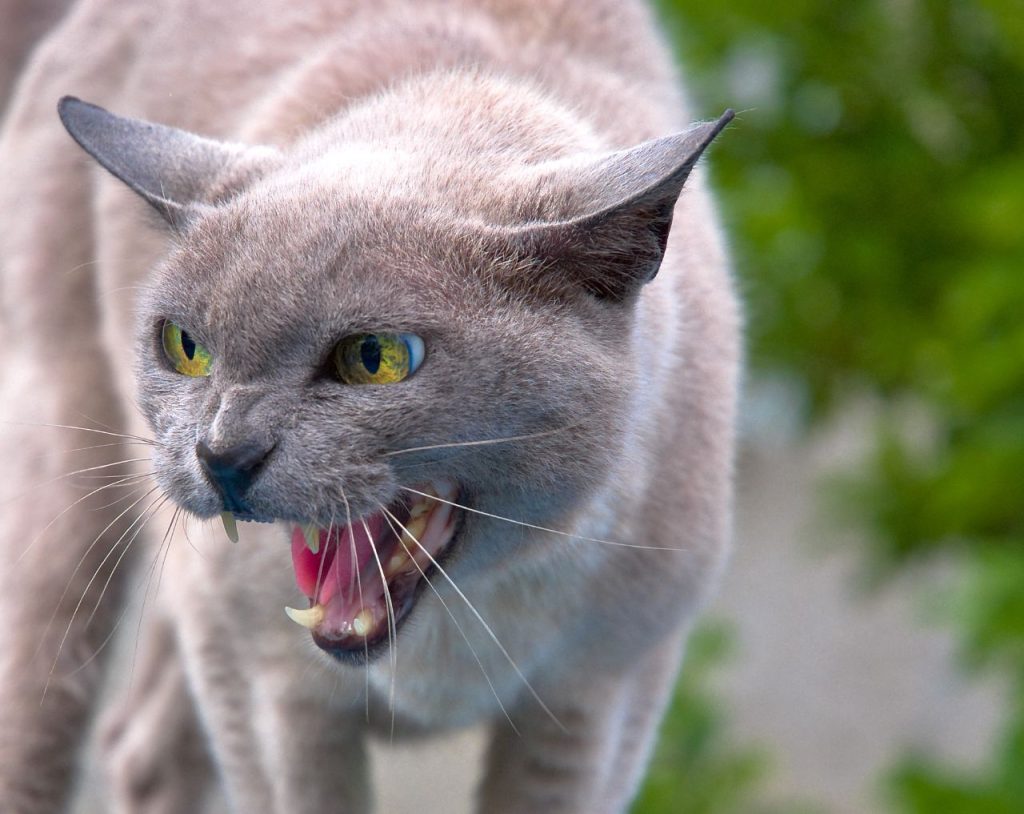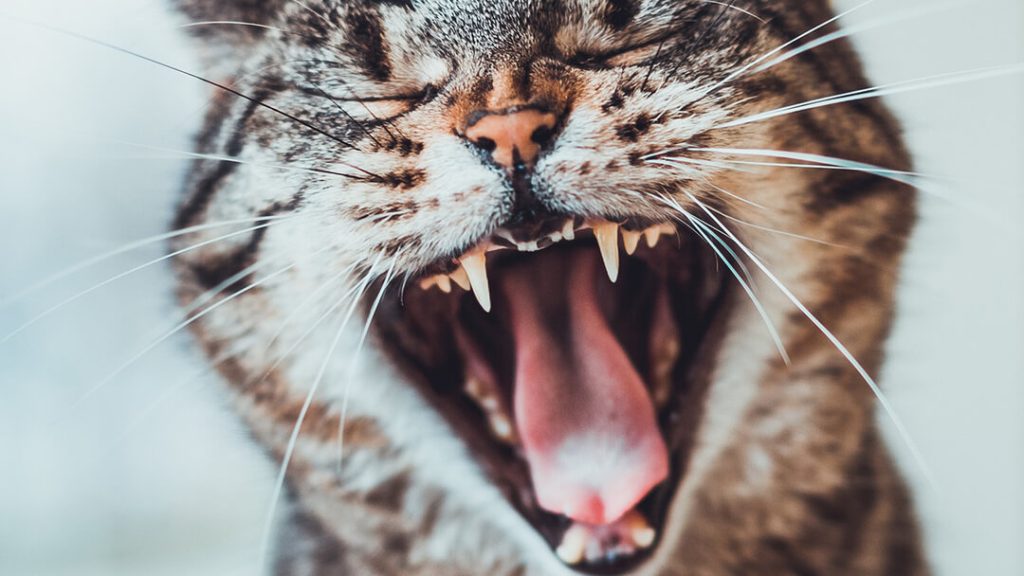Although the name may make you smile, tiger syndrome is a pathology that is not insignificant. In just a few seconds, it can transform your adorable cat into a real aggressive and violent predator. What are the causes ? How to cure it ? We tell you everything about tiger syndrome in cats.
Table of Contents
What is tiger syndrome in cats?
When a normally cuddly and gentle cat suddenly becomes aggressive and violent towards its owner, this behavior is called tiger syndrome. The animal becomes almost unrecognizable to the point of becoming dangerous. Although the causes are diverse, the link with hunger is predominant. Your pet, usually gentle and affectionate, regains its hunting instinct in a few seconds.
This behavior should not be taken lightly. The animal is violent and aggressive, it is a source of danger for itself and for its master. In fact, the cat is no longer capable of controlling itself and tends to hiss, bite and scratch everything it can reach.
The consequences can be relatively impressive. Some people have had their arms and legs slashed with claws, when they have not been attacked in the face! However, rest assured, there are solutions to restore your cat’s good nature and natural tenderness. Tiger syndrome is very easy to treat, just take the right steps!

What causes tiger syndrome?
The causes of tiger syndrome are multiple, although the dietary factor is usually the most predominant.
Hunger and lack of activity
The number one cause of tiger syndrome has to do with your cat’s diet . Indeed, if the food distribution method you have chosen does not meet his needs or his habits, he has a strong risk of becoming aggressive. If, on the other hand, this imbalance is associated with a lack of activity, your cat will need to express its frustration through aggression.
The hunter’s instinct is still present in the cat. Although it is asleep most of the time – and fortunately for you – the fact remains that the animal, like all felines, hunts for food and that this activity is a game and a real need to naturally evacuate tension and nervousness. This factor is accentuated when the cat has not been properly weaned , if it is poorly socialized, if it has not been accustomed to domestic life, etc.

Anyway, the cat needs healthy and balanced food, distributed in small quantities throughout the day. While some small cats know how to ration themselves, others gobble up the contents of an overfilled bowl all at once. A wrong proportion can disturb your animal. His normal excitement when filling his bowl can then take on violent proportions. A malnourished or insufficiently nourished cat will develop a feeling of stress and frustration which gradually turns into aggression. Your cat then attacks you on the hands, feet or face.
The irritation
The cat is by nature tolerant towards those who constitute its environment. He expects the same reciprocity from you. Respect his privacy and leave him alone if he doesn’t want you present. Certain events are restrictive and irritating to him, such as bathing, a visit to the veterinarian, taking medication, cutting his claws, etc. Most felines need quiet to recover from anxiety. If you don’t give him this freedom, he may become irritated and aggressive.
The fear
If your cat is afraid and unable to escape, it will be aggressive. It is then his only means of defense in the face of danger. Unable to control himself, he can quickly become violent and attack you.
The stress
Cats are easily stressed animals. The slightest situation that is somewhat tense, out of the ordinary or abnormal can stress him out. He then needs to release the emotion linked to stress through aggression and he is likely to lash out at you if you are the first person he meets. In this case, the cat no longer dominates itself and it no longer recognizes you.
The game
Play is in a category of its own, because a cat that chews, scratches, or acts nervous while playing does not necessarily pose a danger. He can be brutal, but he doesn’t want to hurt you; on the contrary, he needs to show his pleasure in playing. This pleasure and this manifestation are present from the birth of the kitten, when it plays with its brothers and sisters or with its mother. So it’s not necessarily tiger syndrome.
However, your cat may be affected, as playing can trigger tiger syndrome. The cat who is frustrated at being deprived of his toy or so excited by the game that he can no longer control himself can then manifest tiger syndrome. To avoid this development, it is best to get your pet used to enjoying quiet, non-violent games. Don’t let him get aggressive when he plays because he won’t know where his limits are as he grows up. Biting and scratching you can then become part of the game for him, without trying to hurt you. However, it can pose a danger to your health. When the play session escalates, try to distract him from you by quickly reorienting him towards an object.

What are the possible treatments for tiger syndrome?
Unfortunately, every year, many people abandon their cats because they think they are crazy or too aggressive. However, it is entirely possible to treat your animal, because there is nothing incurable about tiger syndrome! On the other hand, you must be patient, because the more the disease is established, the more difficult it is to dislodge. It’s up to you to adopt good practices to heal your little velvet-footed companion!
Consult the veterinarian
Your veterinarian can help you identify tiger syndrome. If your cat shows aggression when he is hungry or in contact with food, or in the context of other factors, he expresses himself through violence. However, it is important to consult the practitioner, because only he can identify this type of pathology and definitively rule out other causes.
Subsequently, he may suggest that you take medication intended to calm and relieve your animal.
Re balance your cat’s diet
If your cat is found to have tiger syndrome, change its diet. Try a new brand, better quality if possible, with different flavors to avoid food boredom. His meal must be balanced.
Also, make sure he always has food available. Stop rationing and split distribution which create frustration. Let him have his food whenever he wants. He will learn to regulate himself if he does not already know how to do so.
If his previous diet was unbalanced or of poor quality, the veterinarian can prescribe vitamins or food supplements to avoid deficiencies.
Drug treatment
If changing the diet is not enough, a sedative treatment may be prescribed by the veterinarian. This solution will be discussed with the specialist and must remain a last resort.
Play with him!
Take a few minutes each day to play with your cat. You are spoiled for choice when it comes to occupying it, no need to spend a fortune on it! Dedicate time to him, this play phase allows him to release tension and stress, but also to develop his relationship with you.
Respect their needs
Do not force your cat, you will frustrate him more. When he is in a stressful situation or has just experienced an anxiety-provoking event, leave him alone so that he can calm down alone and at his own pace. Walk away and give him space. When he is ready to see you, he will come to find you on his own.